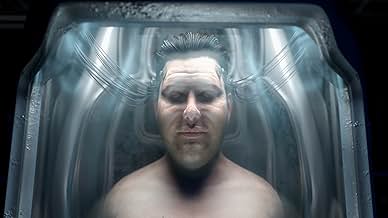IMDb-BEWERTUNG
5,3/10
2337
IHRE BEWERTUNG
Der Dokumentarfilmer Rodney Ascher geht dieser Frage "Leben wir in einer Simulation?" mit Zeugenaussagen, philosophischen Beweisen und wissenschaftlichen Erklärungen auf der Suche nach der A... Alles lesenDer Dokumentarfilmer Rodney Ascher geht dieser Frage "Leben wir in einer Simulation?" mit Zeugenaussagen, philosophischen Beweisen und wissenschaftlichen Erklärungen auf der Suche nach der Antwort nach.Der Dokumentarfilmer Rodney Ascher geht dieser Frage "Leben wir in einer Simulation?" mit Zeugenaussagen, philosophischen Beweisen und wissenschaftlichen Erklärungen auf der Suche nach der Antwort nach.
- Auszeichnungen
- 2 Nominierungen insgesamt
Empfohlene Bewertungen
Poor. I came into this with high hopes having seen "Room 237" and "The Nightmare" previously, and harboring a strong interest in the simulation hypothesis. I get what he was trying to do, basically what he was doing in those last 2 movies, he wanted to center this less on the truth of the matter or convincing the viewer of anything, and more on the experiences of the subjects interviewed. The 3d animation is very enjoyable, but sadly the underlying interviews skew mostly towards random, often delusional, ruminations on experiences in which the subjects felt they percieved the titular "glitch inthe matrix", interspersed with only very few actual philosophers or scientists offering actual substantive thought on the idea of simulation theory. There are also, interspersed, archival footage sections in which phillip k. dick divulges his own experiences which in many ways align with those of the other subjects. About 40 minutes into the film i became rather disenchanted and started to scan through for more interesting sections, finding few. I think the time allotted would have been better served exploring more of what philosophers and scientists have to say about the possibility that we exist in a simulated universe, or could create one in the future, etc. Instead i got some folks ruminating on their experiences playing GTA, talking about how modern games suck, Reciting drowning pool lyrics, and talking about how much they love(hate?) the matrix. Just go read reddit or something, Google simulation theory and you'll have a better time.
First off this is a documentary, and one that except for a lot of production trickery thrown in (speakers clothed in avatar animations, animated scenes, and background music) would be really boring since it's a series of interviews. A bunch of people discuss Simulation Hypothesis which contends that reality is a simulation run by higher order beings, including a 1977 speech by Philip K Dick (who's ref'ed alot in this) where he states "we're living in a computer programmed reality." Later, Elon Musk asserts there's only a one-in-billions chance that we're in the Base (or true) Reality. There are references to computer games and simulations, most notably Minecraft, though not Civilization or The Sims, as well as "The Matrix" films a quote from which this doc derives its title. The doc is interesting in a seminar kind of way, you get a broad overview of this topic from a variety of speakers so that's decent. But the most interesting and possibly the most important thing to bear in mind is something noted at the very beginning, that a college teacher of the narrator once noted that through the ages, we attempt to explain our brain and nervous system in the context of the highest level of technology known at the time. Thus, given photo-realistic computer games, simulations, and virtual reality you have many people attempting to explain reality in that context, apparently unaware that they're simply doing what everyone's done since our caveman ancestors. Personally, I think this topic would do much better as a short six-ep streaming series since it lends itself so well to animations and cut-scenes from current computer simulations and VR games.
"I went to this store, I dunno if you've heard of it, it's called Hot Topic."
Really?
"I love The Crow and I love my black trench coat and I walked around the mall listening to the Matrix soundtrack and I felt powerful, invincible."
The people in this think they're so profound.
Really?
"I love The Crow and I love my black trench coat and I walked around the mall listening to the Matrix soundtrack and I felt powerful, invincible."
The people in this think they're so profound.
If you were in a college dorm getting baked with your friends after watching The Matrix in 1999 - you won't learn anything new. I was hoping for some science and actual scientists. Instead I got random youtubers behind goofy avatars. Philip K Dick's lecture from the 70's was pretty interesting though, so it gets a few stars for that. If you're REALLY interested in seeing this, wait until it's free.
A Glitch In The Matrix is a radical, uniquely-presented look at simulation theory in the digital age - specifically, how those who prescribe to the notion that we're all living in a simulation came to those beliefs and how this belief affects their outlook. Dense, but accessible, directed by Rodney Ascher, it's the rare documentary that asks a question it knows it can't answer.
In the late 1970s, famed author Phillip K. Dick, known for his sci-fi stories, gave a talk where he laid out his theory that we are living in a simulation. This becomes the entry point into the maw of simulation theory, its depth only outmatched by its complexity. A Glitch In The Matrix utilizes a famed and celebrated movie as its main frame of reference in exploring its theme -- The Matrix, a film that put simulation theory into the mainstream. Ascher's film investigates where stimulation theory stemmed from, how its tenets and principles have been echoed throughout history by everyone from Plato to Elon Musk to current times.
The conceit of A Glitch In The Matrix can't so much be explored as marveled at, and the possibilities of a simulated reality tinkered with, and so that's exactly what it does. This film boldly depicts this proposed reality entirely through CG animation and clips from popular culture that have dealt with similar ideas. I respect that a film about simulations indulges so heavily in them. For example, many people who speak in the film have their identities shielded by virtual avatars that filter their perspectives, enhancing the feel of a simulation. This method of using simulation techniques in a film about simulation gets very "meta," but, in doing so, adheres to and honors the film's topic and not in a show-offy or self-congratulatory way.
I have respect for any movie that seeks to make you question the world you live in. Socially and politically, A Glitch In The Matrix does that quite literally. If you're looking for a documentary that finds the key to its main topic and deconstructs it bit by bit, this isn't that, but if you're willing to go on a bit of a journey through a school of thought via the lens of a capable filmmaker that challenges what you think about your own reality, sit down, give this a chance and enjoy it. A Glitch In The Matrix is left incomplete almost by design, but somehow that works to its charm.
I give A Glitch In The Matrix 3 out of 5 stars and an age rating of 14 to 18 for some simulated violence and the description of a violent crime. It just premiered at this year's Sundance Film Festival, and it will be available in theaters and at home on February 5, 2021. Reviewed by Benjamin P., KIDS FIRST
In the late 1970s, famed author Phillip K. Dick, known for his sci-fi stories, gave a talk where he laid out his theory that we are living in a simulation. This becomes the entry point into the maw of simulation theory, its depth only outmatched by its complexity. A Glitch In The Matrix utilizes a famed and celebrated movie as its main frame of reference in exploring its theme -- The Matrix, a film that put simulation theory into the mainstream. Ascher's film investigates where stimulation theory stemmed from, how its tenets and principles have been echoed throughout history by everyone from Plato to Elon Musk to current times.
The conceit of A Glitch In The Matrix can't so much be explored as marveled at, and the possibilities of a simulated reality tinkered with, and so that's exactly what it does. This film boldly depicts this proposed reality entirely through CG animation and clips from popular culture that have dealt with similar ideas. I respect that a film about simulations indulges so heavily in them. For example, many people who speak in the film have their identities shielded by virtual avatars that filter their perspectives, enhancing the feel of a simulation. This method of using simulation techniques in a film about simulation gets very "meta," but, in doing so, adheres to and honors the film's topic and not in a show-offy or self-congratulatory way.
I have respect for any movie that seeks to make you question the world you live in. Socially and politically, A Glitch In The Matrix does that quite literally. If you're looking for a documentary that finds the key to its main topic and deconstructs it bit by bit, this isn't that, but if you're willing to go on a bit of a journey through a school of thought via the lens of a capable filmmaker that challenges what you think about your own reality, sit down, give this a chance and enjoy it. A Glitch In The Matrix is left incomplete almost by design, but somehow that works to its charm.
I give A Glitch In The Matrix 3 out of 5 stars and an age rating of 14 to 18 for some simulated violence and the description of a violent crime. It just premiered at this year's Sundance Film Festival, and it will be available in theaters and at home on February 5, 2021. Reviewed by Benjamin P., KIDS FIRST
Wusstest du schon
- WissenswertesThe title name was taken directly from the black cat Deja vu scene in the film Matrix (1999). In The Matrix, Trinity mentions that a Deja vu "is a glitch in the Matrix".
- VerbindungenFeatures Das sprechende Staubkorn (1970)
Top-Auswahl
Melde dich zum Bewerten an und greife auf die Watchlist für personalisierte Empfehlungen zu.
- How long is A Glitch in the Matrix?Powered by Alexa
Details
- Erscheinungsdatum
- Herkunftsland
- Offizieller Standort
- Sprache
- Auch bekannt als
- Збій у матриці
- Produktionsfirmen
- Weitere beteiligte Unternehmen bei IMDbPro anzeigen
Box Office
- Bruttoertrag in den USA und Kanada
- 2.238 $
- Eröffnungswochenende in den USA und in Kanada
- 1.667 $
- 7. Feb. 2021
- Weltweiter Bruttoertrag
- 2.562 $
- Laufzeit1 Stunde 48 Minuten
- Farbe
Zu dieser Seite beitragen
Bearbeitung vorschlagen oder fehlenden Inhalt hinzufügen


























